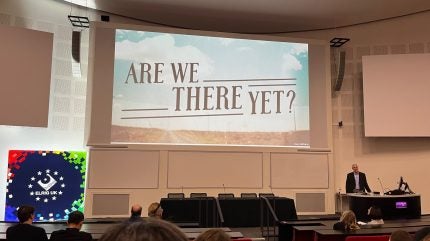
In recent years, specialised cancer treatments such as chimeric antigen receptor (CAR)-T therapies, and antibody-drug conjugates (ADCs) have changed the cancer treatment landscape. However, it could be argued that new approaches to prevention, as well as addressing social deprivation may have more impact and be potentially more cost-effective than many new drugs, says FasT BioPharma’s co-founder Anderson Ryan.
Leading a session at the European laboratory research & innovation group (ELRIG) conference in Manchester, UK, Ryan highlighted that so far, the availability of many new drugs has had a limited impact on overall cancer-related mortality. He said since 2000, more than 600 new oncology therapies have been approved by the US Food and Drug Administration (FDA): “[But], incremental improvements in survival for the most common cancers hasn’t led to a significant reduction in either the number or proportion of people dying with cancer,” says Ryan.

Discover B2B Marketing That Performs
Combine business intelligence and editorial excellence to reach engaged professionals across 36 leading media platforms.
However, Ryan said many patients are living a lot longer with cancer: “If they’re living longer, they would still appear on the mortality rate. The benefits are more in terms of the length of survival rather than survival.”
The amount of money being invested in new cancer therapies is set to increase massively over the next five years, with a recent GlobalData webinar forecasting that the immuno-oncology market is set to grow to over $150bn by 2028.
GlobalData is the parent company of Pharmaceutical Technology.
Whilst the incidence and survival rates with some cancers are increasing, the overall picture might not appear to have improved due to the impact of social deprivation. “It could be argued that investing in and addressing social deprivation might have more impact than many drugs,” says Ryan.

US Tariffs are shifting - will you react or anticipate?
Don’t let policy changes catch you off guard. Stay proactive with real-time data and expert analysis.
By GlobalDataNational prevention programmes such as those promoting the uptake of HPV vaccines, increased awareness around the risks of smoking, and routine screening helped reduce the incidences of certain cancers, or have led to earlier diagnosis that are generally associated with more positive outcomes. Ryan explained that new approaches to both prevention and treatment are needed, such as sensitive detection and accurate localisation of a wider range of most-aggressive tumours such as those affecting the pancreas, lung, and liver: “The earlier you can detect cancer, the more the better chance for cure.”
The ELRIG conference taking place in Manchester, UK on 20-21 March 2024 is covering topics such as animal-free drug discovery, oncology, mass spectrometry and proteomics, and antimicrobial resistance.
Ryan concluded the talk by highlighting that building on the success of immune therapies will lead to a more durable benefit, and molecular fingerprinting may identify new targets and avenues for cancer prevention.




